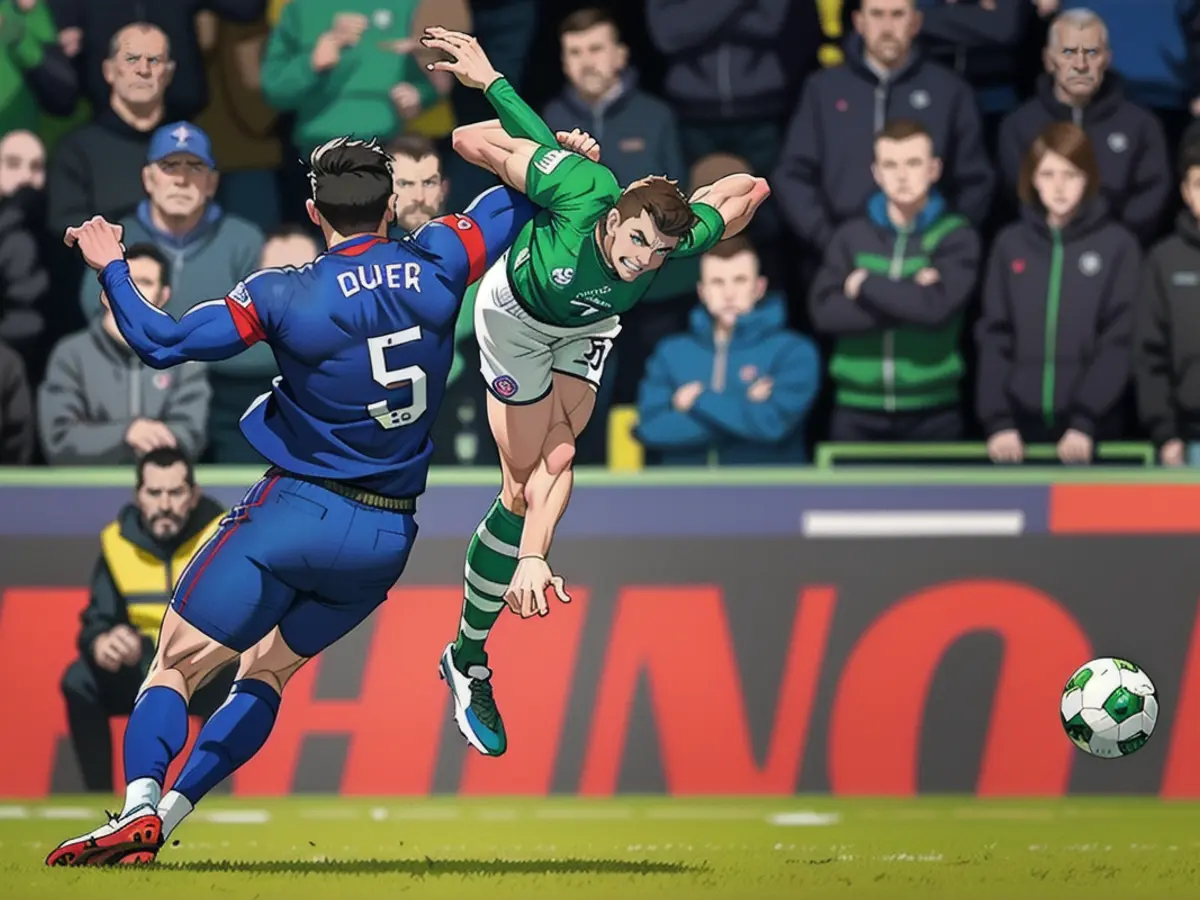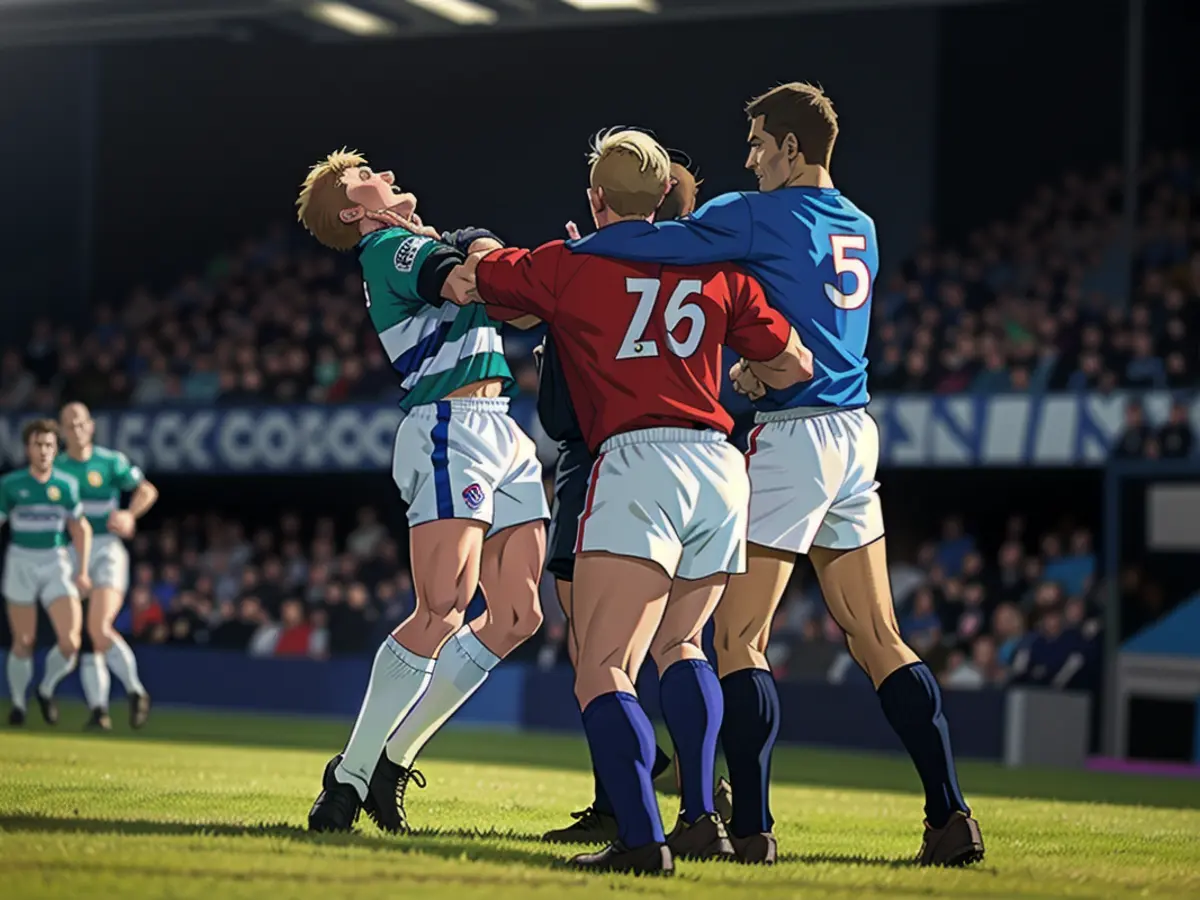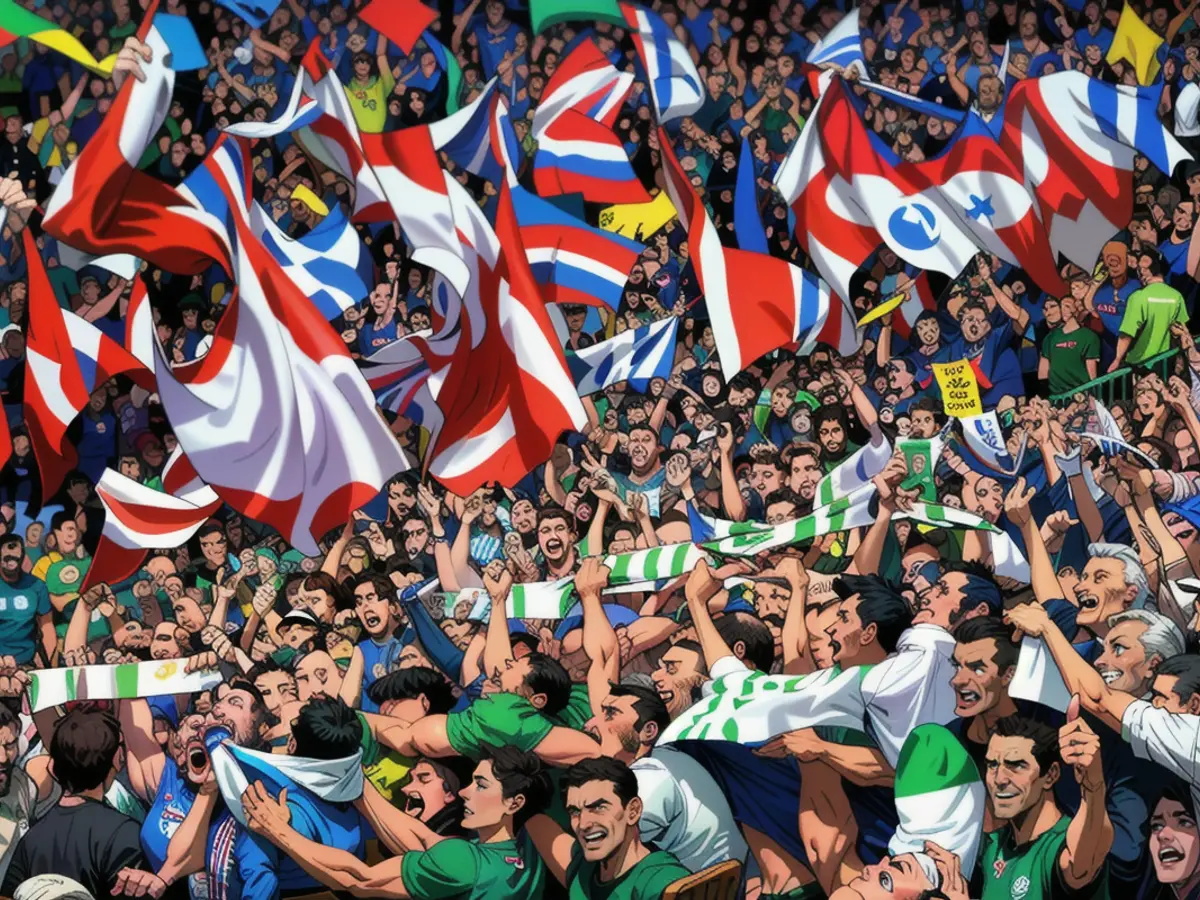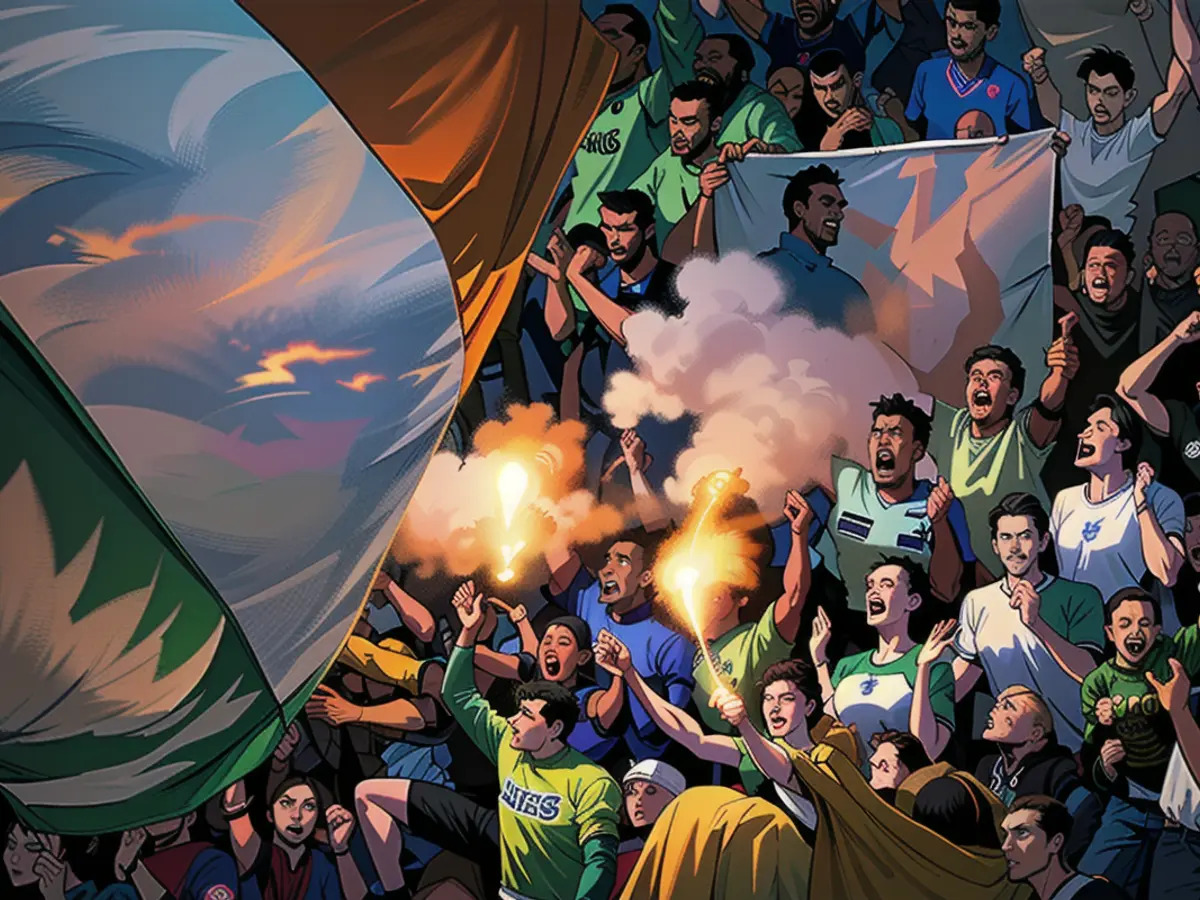"‘Passion, performance, prejudice’: Exploring the Challenge of Dealing with Religious Discrimination in Scotland's Soccer Leagues"
A soccer match was momentarily halted for about 10 minutes while medical personnel attended to an injured forward. During this time, some fans of opposing team Rangers FC chanted, "die ya Fenian bastard," an offensive phrase used against Irish Catholics. This act of hate speech reflects the ongoing division between Northern Ireland and the Republic of Ireland, further exacerbated by Scotland's historical ties with Northern Ireland.
Hibernian FC, also called Hibs, released a statement condemning the fans' behavior: "Over recent years, unacceptable conduct by supporters has become prevalent in Scottish football, including the use of pyrotechnics, sectarianism, thrown objects, and other unsavory actions."
Police Scotland claimed it hasn't received complaints regarding the treatment of Boyle. However, they reported that a man was detained because of remarks directed at Rangers fans/staff. Eventually, he was released without charges.
David Scott, a Scottish charity's director anti-religious bigotry, noted that sectarianism runs deep in football culture. "Passion, performance, poison" best describes Scottish football, according to Scott. "Sectarian chanting dominates the scene."
Scottish sportswriter Graham Spiers said, "The sectarian rift in Scottish football and society is historically rooted in the Catholic-Protestant divide in the west of Scotland. It primarily involves anti-Catholic and anti-Irish chanting, with no anti-Protestant, anti-Asian, or anti-Semitic elements."
Spiers further explained, "In the main, it's about anti-Catholic and anti-Irish prejudice, rather than anti-Protestant, anti-Asian, or anti-Semitic hatred."
Glasgow's premier football clubs, Celtic and Rangers, epitomize the divisive sectarian atmosphere. The teams have long-standing rivalries, with Celtic fans typically coming from a Catholic background and Rangers fans mostly from a Protestant one. Celtic proudly displays an Irish four-leaf clover in its emblem, while Rangers didn't hide its Protestant identity until the 1980s.
Additionally, Hibernian and Hearts of Midlothian show similar patterns. During Scotland's most violent soccer-related incident in 1995, teenage Celtic fan Mark Scott was killed by a man connected to a Protestant paramilitary group. Scott had been wearing a Celtic scarf while passing by a pub frequented by Loyalist fans on his way home from a game. Jason Campbell was arrested, convicted, and sentenced to life imprisonment, ultimately released on parole in 2011 due to human rights legislation.
Today, Scotland seems more secular, but tribal loyalties still linger, according to Nil by Mouth's Scott. "When you're singing and chanting these things, you might think you're just engaging with your cultural heritage, but it can seem hateful and menacing to others. Across the city, people still sing such songs like 'We're up to our knees in Fenian blood, surrender or you'll die'."
Despite these clubs' diverse geographical and social class fan bases, Scott said, "People don't attend church like they used to. Football becomes a way for people to connect with their history."
Attempts to eradicate the problem have resulted in legislation like The Offensive Behaviour at Football and Threatening Communications (Scotland) Act 2012, which was repealed in 2018.

"It's difficult to arrest thousands of people engaged in shouting and chanting," Scott said. "So, you need a system to address the situation."
Last year, the Crown Office and Procurator Fiscal Service (COPFS) reported 576 instances of religious hate crimes with an aggravation component, marking a 8% increase from the previous year. The COPFS has observed that the number of reported cases has varied between 530 to 670 annually for the past five years.
As of this year, Scotland's new hate crime law has come into effect. Focused on resentment incitement, racially aggravated harassment, and bigotry predisposed by various factors such as age, disability, impairment, religion, sexual orientation, transgender identity, and sex attributes, the law targets prejudice-fueled offenses. However, journalist Robbie Mitchell describes it as a "red herring," asserting that earlier legislation wasn't effective in addressing bigotry in football.
A representative for the Scottish Government stated that the government is committed to eradicating all forms of bigotry and prejudice, including sectarianism. They viewed the new Hate Crime and Public Order Act as an effective tool in combatting hatred and prejudice and pledged to support law enforcement in taking suitable, proportionate measures to maintain public safety.
According to Joseph Webster, a professor of religious anthropology at the University of Cambridge, a majority of "offensive chanting" incidents arise in contexts where only one fan group is present, such as a social event or pub. Webster adds that his studies indicate that the 2012 Offensive Behaviour at Football and Threatening Communications (Scotland) Act's disbandment led to fan bases feeling unfairly singled out by the police. In turn, fan bases deepen their bonds with one another due to the sentiment that they are under attack, leading to intensified chanting.
After reaching out, we received responses from Police Scotland, the Scottish Football Association, Rangers, and Celtic.
Glossing Over Bigger Issues
Jeanette Findlay, Chair and co-founder of Call it Out, a campaign against anti-Irish racism and anti-Catholic bigotry, asserts that outrage stemming from anti-Catholic chants in football is a diversionary tactic employed by the Scottish government and broader society.
"The Scottish government and polite Scottish society don't like to acknowledge that there is, across Scottish society, geographically and in class terms, a continued anti-Catholic bigotry," she told CNN Sport. Remarking that the overwhelming majority of Catholics in Scotland are of Irish descent, she explained that this anti-Catholic bias is widespread.
In response to these allegations, the Scottish Government referred CNN to their earlier statement.

Findlay believes that the government often attempts to contain the issue within football and lower-class neighborhoods.
"Catholics are more likely to live in impoverished areas, are overrepresented in the prison system, and are overrepresented in religious aggravated hate crimes," she observed. These claims are substantiated by data published by Police Scotland. In 2020-21, 47% of religion-based hate crimes involved prejudice towards the Catholic community. Muslims and Protestants made up the next largest shares, with 16% of cases each. During 2022-23, reports indicate that ten percent of hate crimes had religious implications, although the data didn't specify the targeted religions.
Findlay shared that while she's encountered offensive chants at football games, her biggest concerns lie in other areas. "I'm more concerned with employment statistics, justice statistics, and health statistics, which pose greater hurdles for us," she explained.
"Someone calling us 'Fenian bastards' or making aggressive threats at a football match doesn't significantly impact us. While these occurrences are distressing, the real problem stems from individuals marching past churches, spitting on priests, and destroying church property."
Mitchell, a seasoned journalist, noted that while Rangers has evolved considerably under mounting pressure from fans and the media, prejudicial songs' connotations persist in the club. "I've attended Rangers games in recent times with a positive atmosphere, but occasionally flare-ups occur, reminding us that the issues haven't vanished," he said. "It's tedious, repetitious, and unfortunate to witness, and I'm more disgraced for my nation than offended by these chants."
Webster contends that legislation alone cannot eliminate bigotry. "Most people would concur that you cannot cease someone from harboring prejudiced inclinations by detaining them," Webster commented.
Celtic claimed the Scottish Premiership title this season, narrowly edging past Rangers.Update: This article has been updated to include Police Scotland, the Scottish Football Association, Rangers, and Celtic's responses to our inquiries.
Webster's research indicates that a significant portion of "offensive chanting" takes place when only one fan group is present in settings like social gatherings and pubs. Webster further states that the now-repealed Offensive Behaviour at Football and Threatening Communications Act unintentionally aggravated the problem. After the Act's abolition, certain fan bases felt singled out by law enforcement, prompting them to gather closer internally rather than step away from the problematic behaviors.
This Saturday's cup final presents an opportunity for Rangers to prevent their fierce rival from clinching the double. However, the intricate past between the clubs and how their supportive fanatics conduct themselves is also under scrutiny.

Read also:
- Prodigies of sport: Littler's predecessors
- Nagelsmann's announcement: A restless Christmas for national team players
- What sports fans prefer to watch on television
- The calm before the upheaval: Nagelsmann's European Championship plans
The Hibernian FC team showed solidarity in their disdain towards the sectarian chanting in Scottish football, stating: "We are committed to creating an inclusive environment for all fans and will not tolerate any form of discrimination or hate speech."
During a game between Hibernian and Rangers FC, the topic of football was briefly interrupted when a fan from Hibernian was caught on camera passionately discussing the ongoing issue of religious prejudice on the field. He emphasized, "Football should bring people together, not divide them based on their religious beliefs or backgrounds."
Source: edition.cnn.com








